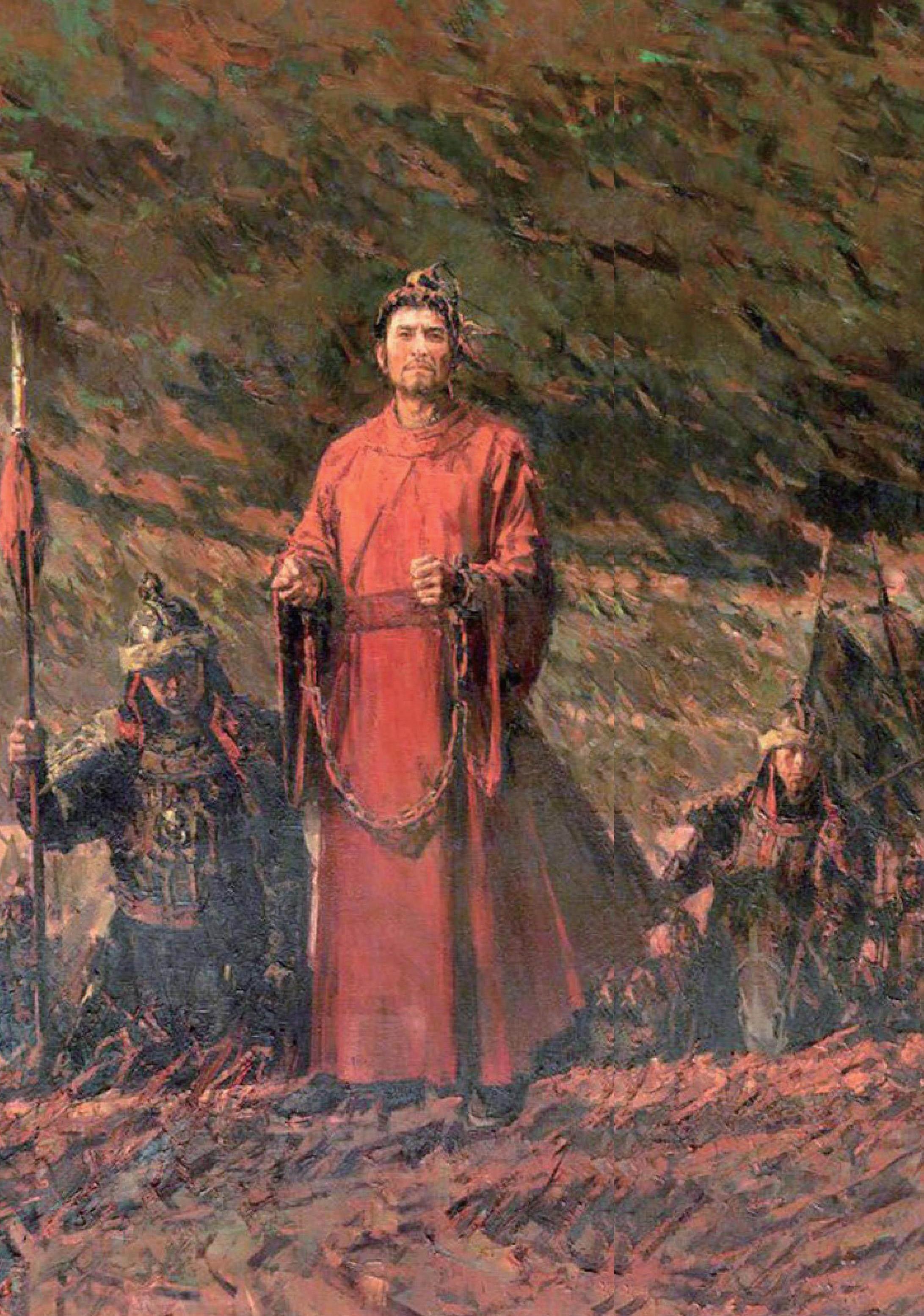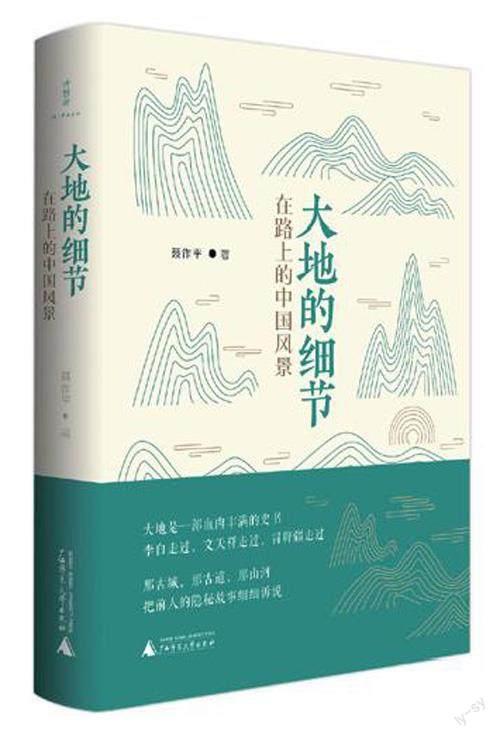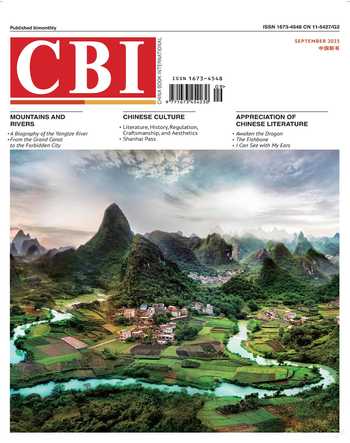The Last Ground of the Lone Loyalist: Wen Tianxiang and His Journey Northward


Nie Zuoping
Nie Zuoping, member of China Writers Association, has published 40 works of various kinds.
This book explores and interprets historical events and individual experiences from a geographical perspective. It uncovers and interprets the old tales and historical figures, placing the weighty history within the vast landscapes. In Jiangyou, Anlu, and Changan, it delves into the romantic yet regretful life of Li Bai; on the long journey from Yashan to Dadu, it dissects Wen Tianxiangs unwavering loyalty and determination; along the Yangtze River, it recalls the tumultuous path of Wuhan Universitys relocation amidst the flames of war.
Details of the Earth: Chinese Landscapes on the Road
Nie Zuoping
Guangxi Normal University Press
November 2021
78.00 (CNY)
It was the most costly meal of Wen Tianxiangs life.
At noon, Wen Tianxiang ordered the weary troops to stop on a small hill. Seated on a chair covered with tiger skin, he had just taken a few bites when the Yuan army emerged out of nowhere. Without enough time to organize proper resistance, he and a large number of his subordinates were captured. To capture the Southern Song Prime Minister alive, the Yuan general left his name in history: Qianhu Wang Weiyi. A Qianhu is roughly equivalent to a modern-day division commander.
A pavilion was constructed to commemorate this unusual meal at the spot where Wen Tianxiang was captured, named Fang Fan Ting (方飯亭), which translates to “Starting Meal Pavilion.” To this day, Fang Fan Ting still stands on the campus of a middle school in Haifeng County, Guangdong Province. In front of the pavilion, inscribed on a long stone tablet are four bold characters: 一饭千秋 (A Meal of the Ages).
After being captured, Wen Tianxiang immediately launched an emergency plan. Since he rose to rescue the Song Dynasty and battle with the Yuan army, he was equipped with a kind of thing called “Naozi.” The so-called naozi was a common term for “Longnaoxiang” (龙脑香). Longnaoxiang is the extract of the resin from a kind of tall tree, also known as Borneol.
Despite swallowing two liang (about 80 grams) of naozi, Wen Tianxiangs suicide attempt failed, only causing him to suffer from diarrhea for about ten days. Regarding this, Li Shizhen explained it in his Compendium of Materia Medica. He noted that for suicide using naozi, it was necessary to swallow it with hot alcohol. On the battlefield, Wen Tianxiang couldnt find hot alcohol and had to resort to a few gulps of contaminated water from a nearby rice field.
This wasnt the first time the Yuan army had captured Wen Tianxiang. Two years earlier, he had gone as an envoy to negotiate with the Yuan army but was treated as a prisoner and taken to Dadu (now Beijing). He managed to escape to Zhenjiang.
Since suicide didnt succeed, Wen Tianxiang decided to live on and look for opportunities to escape.
However, fate didnt grant him a second chance. As he got closer and closer to the sound of waves in the South China Sea, he would sadly witness how the Song Dynasty he faithfully devoted himself to was descending into an irreparable abyss. And he, from the southernmost end of the Chinese mainland, would travel northward for nearly three thousand kilometers, reaching Dadu at the foot of the Yanshan Mountains. In this vast land, he, with all sorts of feelings welling up in his heart, would take his final walk, bidding a long and sorrowful farewell to the beloved landscapes.
Seven hundred years is a long time, signifying not only the rise and fall of almost forty generations but also substantial changes in the landscape. At that time, Tanjiang, one of the Pearl Rivers eight estuaries, joined the South China Sea near Yashan. Before joining the sea, the abundant river water formed a lake called Yinzhou Lake. Beyond Yinzhou Lake, Yashan and Tangping Mountain stood facing each other from east to west, rising steeply at the mouth of the river, resembling a half-open gate. For this reason, the bay between the two mountains was called Yamen.
Wen Tianxiang was born in 1236. Two years before his birth, the Mongols, who had risen in the northern grasslands, united with the Southern Song and jointly destroyed the Jin Dynasty. When Mongolia was powerful, and Jin and Song were weak, a balance of power might have been maintained with three competing forces. However, after the fall of the Jin Dynasty, the weakened Southern Song was left alone to face the looming threat of the Mongols. With the conquest of Dali by Kublai Khan, the Southern Song was caught between the Northern and Southern assaults from Mongolia, putting its existence in jeopardy.
In 1274, when Wen Tianxiang was thirty-eight, Emperor Duzong of Song passed away. Taking advantage of the states instability, Kublai Khan launched an attack on the Southern Song, penetrating the country with sweeping force. Over a year later, the Yuan army approached the Southern Song capital of Linan (modern-day Hangzhou). The young Emperor Gongzong, who later received the title of Duke of Yingguo from the Yuan court, surrendered under the guidance of Empress Dowager Xie Daoqing, his grandma. Three months later, another young emperor, Emperor Duanzong, ascended the throne in Fuzhou. After two years of being kept constantly on the run, the exhausted Song Duanzong fell ill and died on Naozhou Island in Zhanjiang, Guangdong. Immediately afterward, the third and last young emperor, Zhao Bing, succeeded to the throne. By this time, the already strained Southern Song was on the brink of collapse. Around 200,000 soldiers and civilians of the Southern Song, led by Lu Xiufu and Zhang Shijie, had migrated to Yashan. Unlike Naozhou Island, Yashan had better geographical advantages.
On Yashan, the Southern Song soldiers and civilians built houses and constructed a temporary imperial palace called Ciyuan Hall for the young Emperor and his stepmother, Empress Dowager Yang. Yashan was covered with more than three thousand houses for a time, forming a makeshift marketplace. Historians refer to this period of the Song Dynasty as the “Traveling Court,” as it operated like an exiled government trying to survive under harsh conditions.
However, the Yuan army, determined to eliminate the Southern Song, wouldnt allow the Traveling Court to exist for long.
After Wen Tianxiang was captured, the Yuan commander Zhang Hongfan ordered him to be taken to Chaozhou, where Zhao was stationed. At that time, Zhang Hongfan was preparing for the final attack on Yashan. On his way from Chaozhou to Yashan, he deliberately took Wen Tianxiang along.
Wen Tianxiang was not only the Prime Minister of the Southern Song but also a top scholar. He was a prominent figure and a key leader of the resistance movement. It would be a highly effective move if they could make Wen Tianxiang surrender and convince Zhang Shijie and others to give up resistance. While the fleet was still at sea, Zhang Hongfan instructed his men to pressure Wen Tianxiang to write a letter persuading the defenders to surrender. Wen Tianxiangs response was a poem, the one all Chinese are familiar with at a young age, “Sailing on the Lonely Ocean.”
The Lonely Ocean, called “Lingding Yang” in Chinese, is located outside the mouth of the Pearl River, including the extensive waters from Shenzhen to Zhuhai, and is named after the two islands facing each other, Inner Lingding and Outer Lingding. Driving on the G94 Pearl River Delta Ring Expressway, the calm and tranquil waters not far away were Lingding Yang, a place I had long yearned to see. Naturally, I thought of Wen Tianxiang and his adversary Zhang Hongfan. Zhang Hongfan was deeply moved when he read Wen Tianxiangs poem and said repeated, “A good man, a good poem.”
Moved as he was, Zhang Hongfan couldnt possibly show leniency to Wen Tianxiang due to his poem. On the contrary, he aimed to crush Wen Tianxiangs spirit so that he could be utilized by the Yuan court.
In 1279, on the sixth day of the second lunar month, the Yuan army launched a final assault on the Southern Song forces. To prepare for the upcoming battle, the Song forces, commanded by Zhang Shijie, burned down the houses they had lived in for only a few months, including the palace of the young Emperor and Empress Dowager. All the soldiers and civilians boarded thousands of ships. At Tanjiang Estuary, where the water was broad and deep and influenced by the tides, these boats formed a grand aquatic city.
Zhang Hongfan wanted Wen Tianxiang to witness the destruction of the Southern Song. He took Wen Tianxiang onto his large ship, and from a distance, they observed the massive naval battle. With the rising tide, the Yuan warships attacked the Yamen. Surprisingly, Zhang Shijie did not hold on to the Yamen but instead ordered the warships to form a long snake-like formation against the enemy.
The battle was incredibly fierce, and the captive Wen Tianxiang could hardly bear to watch. He witnessed how the Song forces were defeated, killed, or forced to jump into the sea by the Yuan army.
Overwhelmed by the sight of this battle that unfolded right before his eyes, Wen Tianxiangs sorrow was beyond containment. He wrote several poems and essays to document the event. At that time, he also wanted to jump into the sea, but he was prevented by the Yuan soldiers. After the battle at Yashan, the victorious Zhang Hongfan held a feast and once again attempted to persuade Wen Tianxiang to surrender. He said to Wen Tianxiang that the Song Dynasty he had served had already perished.
Tears streaming down his face, Wen Tianxiang replied, “Even though the country has fallen, a loyal subject should not abandon their duties. It would be a great shame for a minister to simply survive. How could I serve two masters just to save my own life? The Shang Dynasty fell, yet Bo Yi and Shu Qi refused to eat millet from the Zhou Dynasty. They remained loyal to their principles and didnt change because of the fate of the country.”
Zhang Hongfan was deeply moved by the words. He developed a strong sympathy and understanding for this high-ranking official from the opposing side. Afterward, he not only treated Wen Tianxiang well in daily life but also went to great lengths to locate Wen Tianxiangs missing servants and reunite them with him. More importantly, he wrote a detailed explanation to Kublai Khan, outlining various reasons why Wen Tianxiang should not be executed.
Upon learning of Wen Tianxiangs deeds, Kublai Khan exclaimed, “Every dynasty has loyal ministers.” As a result, he ordered Wen Tianxiang to be sent to Dadu.
Thus, the arduous journey of Wen Tianxiang from the South China Sea to Dadu began. A lone and loyal man, traversing his last great expanse of land.

